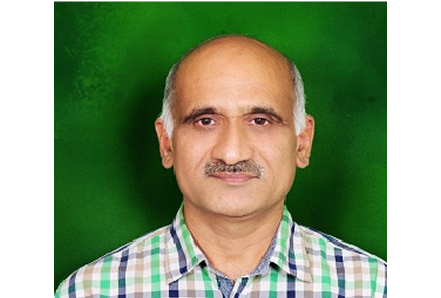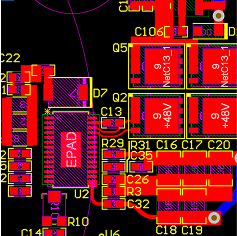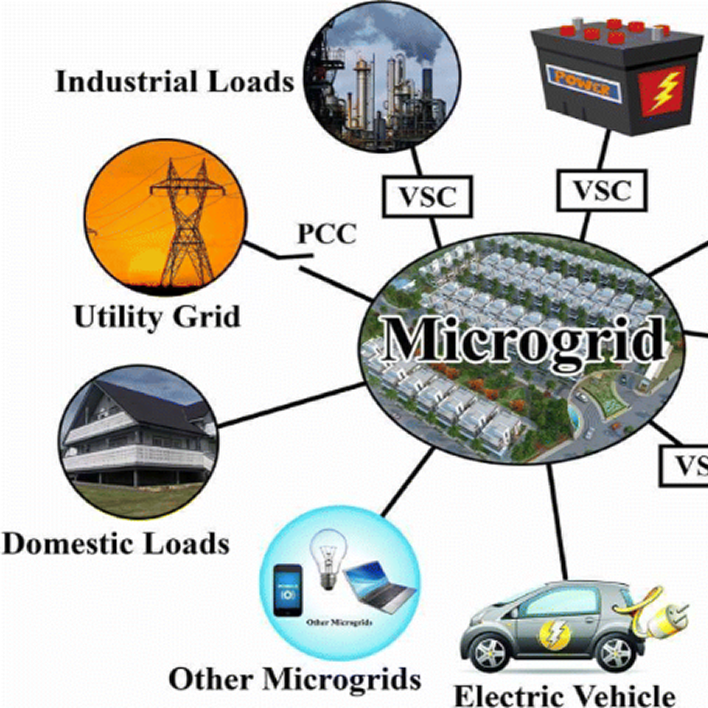Department of Electrical and Electronics Engineering
Empowering students with cutting-edge knowledge and technical expertise in Electrical and Electronics Engineering to innovate, lead, and excel in the evolving global technological landscape.

NIE Mysuru's EEE department strives for global recognition via excellent education, leading research, and dedicated professionals driving technological innovation and societal impact.
Dr. H Pradeepa
Head, Electrical and Electronics Engineering

12 Day Offline Faculty Development Program
Established in 1958, NIE Mysuru's EEE department is a center for education and research, offering UG, PG, and Ph.D. programs emphasizing innovation, practical learning, and industry ties in areas like smart grids and AI. Infosys co-founder N. R. Narayana Murthy is an alumnus.
po’s
PO1:
Engineering knowledge: Apply the knowledge of mathematics, science, engineering fundamentals and an engineering specialization to the solution of complex engineering problems.
PO1:
Engineering knowledge: Apply the knowledge of mathematics, science, engineering fundamentals and an engineering specialization to the solution of complex engineering problems.
PO1:
Engineering knowledge: Apply the knowledge of mathematics, science, engineering fundamentals and an engineering specialization to the solution of complex engineering problems.
po’s
PO1:
Engineering knowledge: Apply the knowledge of mathematics, science, engineering fundamentals and an engineering specialization to the solution of complex engineering problems.
PO1:
Engineering knowledge: Apply the knowledge of mathematics, science, engineering fundamentals and an engineering specialization to the solution of complex engineering problems.
PO1:
Engineering knowledge: Apply the knowledge of mathematics, science, engineering fundamentals and an engineering specialization to the solution of complex engineering problems.
po’s
PO1:
Engineering knowledge: Apply the knowledge of mathematics, science, engineering fundamentals and an engineering specialization to the solution of complex engineering problems.
PO1:
Engineering knowledge: Apply the knowledge of mathematics, science, engineering fundamentals and an engineering specialization to the solution of complex engineering problems.
PO1:
Engineering knowledge: Apply the knowledge of mathematics, science, engineering fundamentals and an engineering specialization to the solution of complex engineering problems.

About FDP
Resource Person Prof.C. K. Raju, PhD (ISI)
TGA LaureateHonorary Professor, Indian Institute ofEducation. (Ex-Tagore Fellow, Indian Instituteof Advanced Study)
Outcomes of the FDP
❖ Historical and philosophical background. Rejection of axiomatic (formal) mathematics (Reasoning minus empirical) as against philosophy of Ganita (Reasoning plus empirical)
❖ Origin of calculus in India which used finite differences and recursive technique in arriving at precise trigonometric values and its 1000 year of journey in becoming more accurate and its contemporary superior pedagogical value.
❖ Significance of non-Archimedean field of rational functions (Brahmagupta’s polynomial arithmetic) along with philosophy of zeroism in achieving conceptual clarity
❖ Solution of harder real life calculus problems not covered in usual calculus courses
Registration Details
Registration Fees: 1770/-(1500+18% GST)
Max. No. of Participants: 40 Reg fee includes working lunch and tea
Last Date for registration: 30th June 2025
Address for Correspondence Dr. B.R.Ananthapadmanabha Associate Professor, Dept. of EEE, NIE
Mysuru Mob: 6360521834E-mail: ananthpbr@nie.ac.in
Enter the details in the following google :
About The Department
Established in 1958, NIE Mysuru's EEE department is a center for education and research, offering UG, PG, and Ph.D. programs emphasizing innovation, practical learning, and industry ties in areas like smart grids and AI. Infosys co-founder N. R. Narayana Murthy is an alumnus.
po’s
PO1:
Engineering knowledge: Apply the knowledge of mathematics, science, engineering fundamentals and an engineering specialization to the solution of complex engineering problems.
PO1:
Engineering knowledge: Apply the knowledge of mathematics, science, engineering fundamentals and an engineering specialization to the solution of complex engineering problems.
PO1:
Engineering knowledge: Apply the knowledge of mathematics, science, engineering fundamentals and an engineering specialization to the solution of complex engineering problems.
po’s
PO1:
Engineering knowledge: Apply the knowledge of mathematics, science, engineering fundamentals and an engineering specialization to the solution of complex engineering problems.
PO1:
Engineering knowledge: Apply the knowledge of mathematics, science, engineering fundamentals and an engineering specialization to the solution of complex engineering problems.
PO1:
Engineering knowledge: Apply the knowledge of mathematics, science, engineering fundamentals and an engineering specialization to the solution of complex engineering problems.
po’s
PO1:
Engineering knowledge: Apply the knowledge of mathematics, science, engineering fundamentals and an engineering specialization to the solution of complex engineering problems.
PO1:
Engineering knowledge: Apply the knowledge of mathematics, science, engineering fundamentals and an engineering specialization to the solution of complex engineering problems.
PO1:
Engineering knowledge: Apply the knowledge of mathematics, science, engineering fundamentals and an engineering specialization to the solution of complex engineering problems.

Vision
The department will be an internationally recognized centre of excellence imparting quality education in electrical engineering for the benefit of academia, industry and society at large.
Mission
Impart quality education in electrical and electronics engineering through theory and its applications by dedicated and competent faculty.
Nurture creative thinking and competence leading to innovation and technological growth in the overall ambit of electrical engineering.
Strengthen industry-institute interaction to inculcate best engineering practices for sustainable development of the society.
Our Programs
Undergraduate
BE in Electrical and Electronics Engineering
Post-graduate
M.Tech in Power systems and Power Electronics

Our Faculty
The department faculty has some of the most accomplished Professors in the Institution. They not only guide the students through their academic challenges but also help them in their personal development.
Curriculum
Access syllabus and timetable for courses taught under the Undergraduate and Post-graduate programmes.
Course name
Course code
Credits
Research/Industry Internship
21EE8I01
8
Project Work (to be completed in VII semester)
21E8P01
8
Department Elective 3
21EE7EXX
3
Research/Industry Internship
21EE8I01
8
Department Elective 5
21EE7EXX
3
Project Work (to be completed in VII semester)
21E8P01
8
Department Elective 4
21EE7EXX
3
Ability Enhancement Course 6 - MOOC
21EE7AXX
3
Technical Seminar
21EE7S01
1
Switchgear and Protection
BEE601
4

Resources & Infrastructure
The Department is equipped with state-of-the-art laboratories and modern infrastructure to support both academic and research activities. Key facilities include advanced labs for Power Systems, Machines, Control Systems, Embedded Systems, and Power Electronics. The department also houses simulation tools, design software, and project development spaces to encourage innovation and hands-on learning.
Best Practices
We implement innovative educational approaches to ensure our students receive a world-class education and preparation for their careers.
Courses with integrated Laboratories
Some courses have lab or tutorial component so that students can learn hands if there has to be practical exposure, or tutorial if there is some problem related that they need to learn.
Design based laboratory projects
Electronics component needs exposure to design on some practical applications, which students work and implement them and do end of semester they show case them.
Usage of open source and/or licensed software tools in the laboratories
We either use open source software or licences tools. Constantly upgrade the curriculum to the latest cutting-edge technologies. Every year we look at the current curriculum and get feedback from various stakeholders and update the syllabus accordingly.
Elective courses by resource persons from Industries (IDE).
From 5th semester onwards we do bring in the blend of Industry driven courses so that the students get exposure to latest and cutting edge technologies for them to learn and implement
Career guidance to the students through academicians/industry experts and alumni
Every year we call upon our alumni or academicians for expert talk to make the students know about what is happening in the industry.
Moodle LMS for Course material, Quizzes & Assignments
All our course material, quizzes and assignments are made available through LMS (moodle).
Departmental Activities
Get a glimpse of all the latest conferences, project displays, lectures, seminars, and other programmes conducted by the Department
Title of Seminars/Conferences
Resource Person
Date
Student seminars are held at the department every year in the 3rd sem.
Dr. Sandeep
Kumar Agarwal
29 Dec 2023
and
December 29, 2023
IoT seminars are held during the handling of the elective - as part of the learning process.
Dr. Sandeep
Kumar Agarwal
29 Dec 2023
and
December 29, 2023
The Inaugural event of the Department of MCA was held in 2022.
Dr. Sandeep
Kumar Agarwal
29 Dec 2023
and
December 29, 2023
Web seminars with design of websites are held during the 1st semester - as part of the learning process.
Dr. Sandeep
Kumar Agarwal
29 Dec 2023
and
December 29, 2023
Student Projects
Research & Development

Get in touch

Dr. H Pradeepa
Associate Professor and HOD
Department of Electrical and Electronics Engineering
The National Institute of Engineering

Mysuru - 570 008

















































